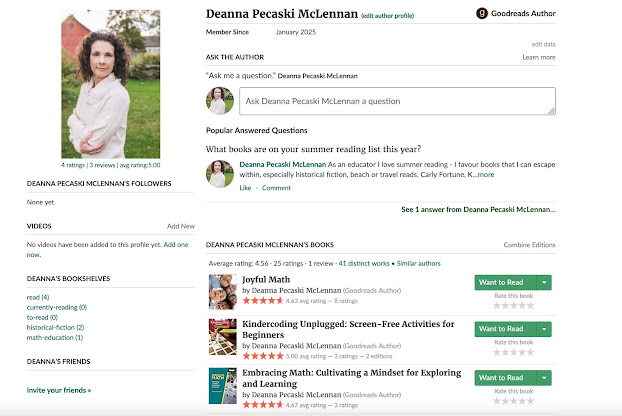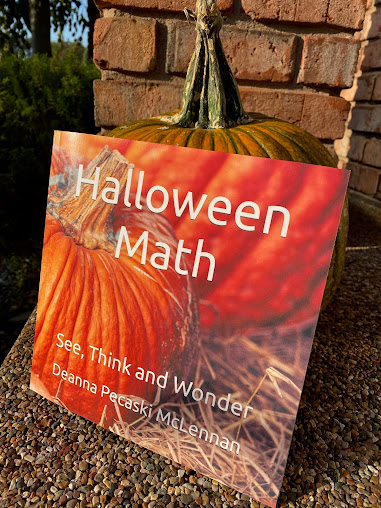Toni Cameron and Deanna McLennan in conversation with Stenhouse’s Kassia Omohundro Wedekind about creating a supportive, curious, and playful environment for mathematics in early childhood classrooms, the importance of stepping back to listen, and (of course!) what this all looks like these days.
I am a Reggio Emilia inspired Full Day Kindergarten teacher and mother to three young children. This blog is meant as a communication tool for the families of our children and as a learning tool for the many educators who follow us. Please feel free to comment on posts and participate in our collective understanding of emergent curriculum.
Wednesday, February 5, 2025
Monday, January 13, 2025
Goodreads!
Like many educators I am a avid reader who devours historical fiction. This is nothing like a good book that pulls you in and helps you forget the cold, snowy January weather of Ontario. While researching my next read I stumbled upon the Goodreads website. Where has this been my whole life? I was fascinated to quickly and easily find many titles to add to my reading list. I was also deeply surprised to find many of the books I have authored on the site - not just their titles but ratings too! This inspired me to create an author page in order to help me connect with readers in a new and fresh way. If you are on Goodreads come find me! Even better I would love a review of my books if you have read or purchased them. Come ask me a question or suggest your favourite book to read! I'm excited to connect with you in a new way!
Saturday, October 2, 2021
Pumpkin Math
Autumn is such a wonderful time of year! The colours and textures can inspire such rich math conversation! This past weekend we visited a few farm stands in the area and all I saw was math around me! I'm hoping that these photos will be useful as math prompts for 'math talk' conversations with children.
Show children a photo and ask them to share what they 'see, think and wonder' about each photo. The 'see, think, wonder' thinking routine can be used to help children delve more deeply into exploring and articulating what they notice in a specific situation. As children notice and name what they see, they can make connections to their own experiences and ideas, and form questions for further exploration and math research.
Educators can also ask children specific math questions to guide their thinking. This can be especially helpful if the math concepts in the photos are geared towards an existing exploration the children are having, or if specific curriculum and assessment investigations are needed by the children. Sample math questions are provided below!

Friday, August 21, 2020
Inspiring Math Learning Outdoors using Moments and Photos
The world outdoors is filled with amazing math moments. Almost anything you find - whether it is natural or man made - contains an element of math.
From the symmetry we find in flowers or garden wheels...


...the interesting shapes we can spot in structures and found objects...
...the uniquely formed angles hiding in unexpected places...
...to the potential for discovering and playing with numbers.
The world around us uses math in the most interesting of ways.
Many educators are looking ahead to this school year, wondering how to engage children in authentic math moments while decreasing the risks associated with the current pandemic. Many experts recommend holding classes outside. This option is appealing, but some wonder how to take the math learning they traditionally offer in the classroom to the world beyond. How might one fulfill curriculum expectations and assess student learning while being outside?
I suggest looking to the world around you for math inspiration!
Whether you are a teacher who will be holding your classes outside, or planning to engage children in online learning, using the outdoors to inspire math talks can be an authentic and exciting way for children to delve more deeply into math concepts while seeing their application to real life.
Teachers can chose specific photos or places in the yard to introduce curriculum concepts needed to be covered (e.g., showing a photo of rain drops in a puddle to introduce the concept of radial symmetry) or ask children to see/think/wonder about a phenomena they notice and planning a mathematical inquiry centred around this (e.g., estimating and then problem solving for how to calculate the number of daisies that have grown in the garden).
There is math potential everywhere!
To help get you started, I have compiled a collection of 75 photos featuring natural and man made objects from the outdoors. You can access these here: Photos to Inspire Math Conversations
Feel free to use them to inspire math conversations in your physical classroom, or during an online math talk. Download them, print them, use them however you'd like to facilitate math learning with your students. Heading outside to explore math might seem daunting at first, but listening to the observations and questions that children have can be a wonderful start to a rich, mathematical inquiry.
I'd love to see the math learning you experience as we head back to school. Don't forget to tweet me @McLennan1977 and share the amazing #foundmath you discover in your explorations outdoors!

















